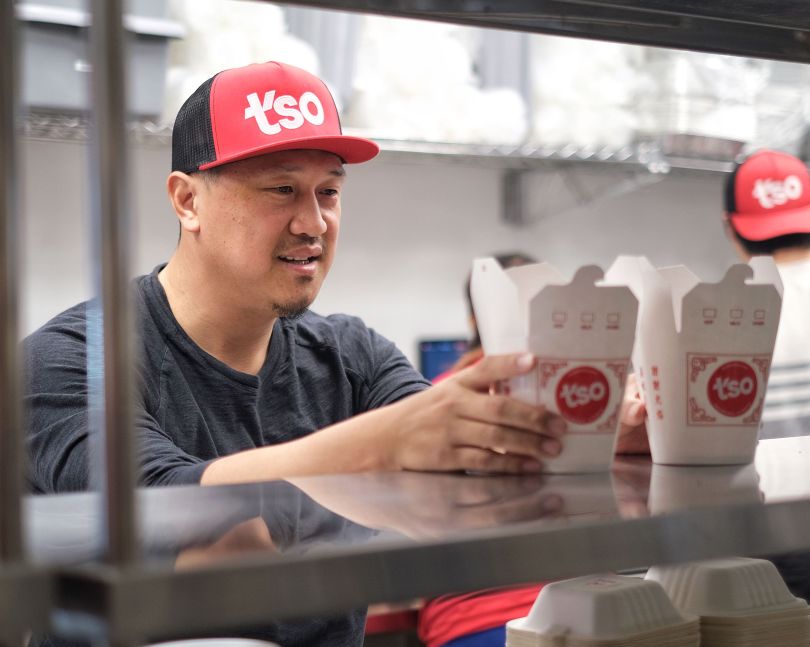
What Domino’s has done to bring tech innovation to pizza delivery, Min Choe wants to do for another delivery staple: Chinese-American food.
In 2017, Choe co-founded Tso Chinese Delivery to keep the spirit of Chinese-American entrepreneurship alive and, in some cases, introduce it for the first time to Austin. The foodtech startup offers on-demand delivery and takeout of Chinese-American classics like fried rice, lo mein and, yes, General Tso’s chicken, a dish that is unknown in China and developed by a first-generation Taiwanese immigrant in NYC.
On Thursday, the company announced it raised $2 million in funding, which it plans to spend on new tech features and opening a third location in South Austin. By the end of 2021, the 60-person startup plans to open two more locations in Austin and expand on into Dallas.
“Tso is based off of 50 years of A/B testing Chinese menus against the American palette,” Angell Tsang, the company’s chief technology officer and a second-generation Chinese American, told Built In.
The company has been profitable since day one, Tsang said, which he credited to its business model, which does not rely on third-party providers for any of its software needs. By building all its own tech, Tso is able to offer free delivery without any surcharges, which results in lower-cost potstickers for hungry customers. At the end of the day, Tsang said Tso aims to build software equity like Domino’s has.
“Domino’s today is really an e-commerce logistics company that happens to sell pizza,” Tsang told Built In. “We like to brand ourselves as the same exact thing that happens to sell Chinese food.”
Although the company is delivery-first, it does have two small retail locations, which still do receive some foot traffic. Tso plans to use the cash to build kiosks in the lobby of its buildings, particularly at its Cherrywood location, which Tsang said receives a lot of walk-in customers since it’s next to a grocery store and there aren’t many Chinese restaurants in the area. The kiosks will allow customers who may not be used to ordering on their smartphones or computers to still request dinner from Tso.
“We’re not necessarily a ghost kitchen,” Tsang said. “We do have a retail presence. Not that it’s on purpose, but we do think that there’s something to that.”
The company also plans to build a machine learning model that dictates its kitchen logistics, deciding which Tso location should make what dish for what customer, and understand what order items should be made and in how many batches. Tso also plans to build an on-demand catering platform, which will allow customers to place immediate requests without the normal, four-day lead time.
Also on the startup’s roadmap are personalization features for its platform that would allowing customers to set their profile to vegan, for example, and then only displaying dishes that are made without animal products. This is another change from traditional mom-and-pop Chinese shops, which started opening in the 1950s as Chinese immigrants rushed to America to escape Mao Zedong’s authoritarian China. Tso’s has tweaked many Chinese-American classics like fried rice to be gluten-free, vegan and cater to dietary preferences.
Although American demand for these dishes has increased across the United States — “Asian food is the fastest growing sector in the industry, by a lot,” Choe told Built In — there has been a net decline of Chinese restaurants as first-generation immigrant entrepreneurs retire. When their children do open restaurants, Choe said they prefer to open Asian fusion establishments, as a reflection of the “cultural melting pot” that is America.
“Our immigrant parents opened up a restaurant to make enough money to support their children going to college and becoming attorneys and doctors,” Choe said. “There’s very little expectation that the children will take over the restaurant. So what’s happening is that, when the parents are starting to retire, the restaurants are just closing.”
Also this week, the company, which is a B-corporation, released the results of its #TsoGiving campaign, which raised more than $100,000 in free meals for needy Austinites.
The round was led by former Whole Foods co-CEO Walter Robb, Bazaarvoice co-founder Brett Hurt and Brian Spaly, founder of Bonobos and Trunk Club.


